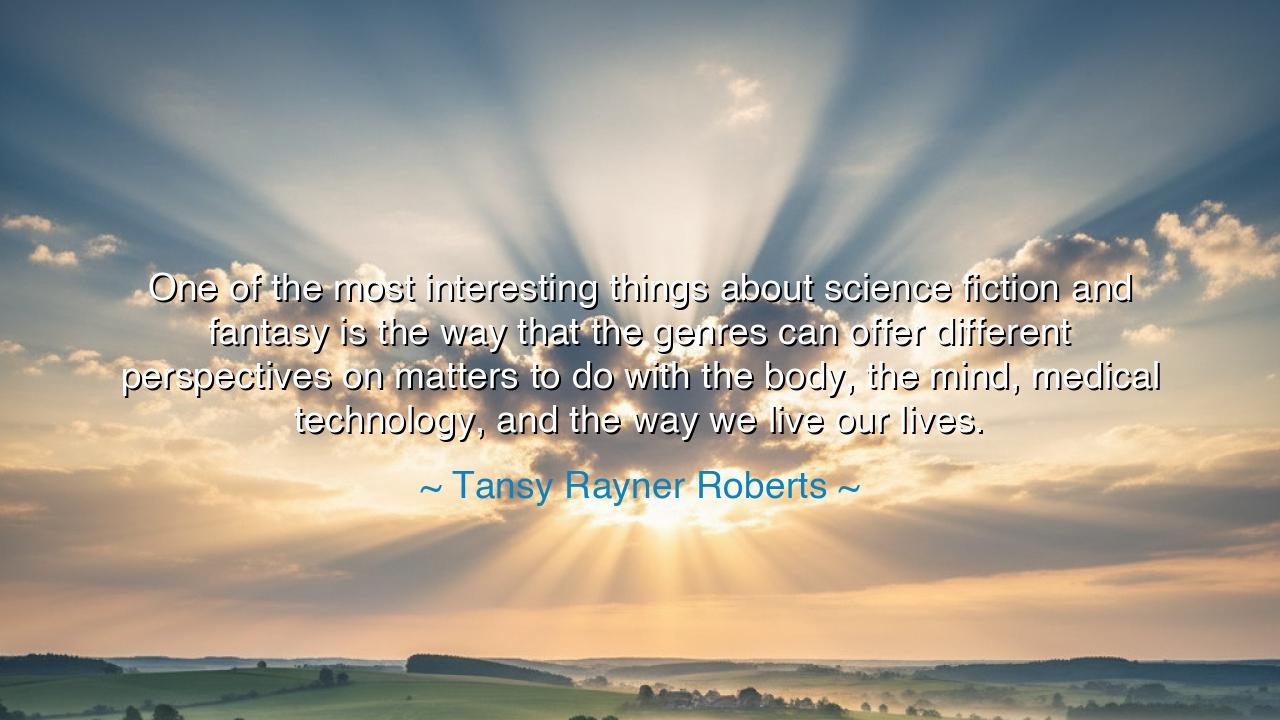
One of the most interesting things about science fiction and
One of the most interesting things about science fiction and fantasy is the way that the genres can offer different perspectives on matters to do with the body, the mind, medical technology, and the way we live our lives.






Hear the words of Tansy Rayner Roberts, a weaver of tales, who declared: “One of the most interesting things about science fiction and fantasy is the way that the genres can offer different perspectives on matters to do with the body, the mind, medical technology, and the way we live our lives.” In these words is revealed the secret power of storytelling—that through imagined worlds we may see our own more clearly, that through the unreal we may grasp truths too vast or too hidden to face directly.
The meaning is profound. Science fiction and fantasy are not idle diversions, not mere escape from reality. They are mirrors, prisms, and crucibles. They allow us to explore questions of the body, the mind, and the soul in ways that ordinary speech cannot contain. In them, medical technology becomes not just machines, but symbols of hope and fear. The mind becomes not just neurons and thoughts, but landscapes of imagination, danger, and transformation. These genres give us perspective, a way to step outside ourselves so that we may return wiser.
Consider the tale of Mary Shelley’s Frankenstein, a story that arose not from laboratories but from a young woman’s imagination. In its pages, the ambition of science and the peril of unchecked creation are explored more vividly than in any textbook. The monster, though born of fantasy, became a mirror for humanity’s fear of technology, of medical progress without ethics, of power without respect. Shelley's story still echoes today, reminding us that fiction can warn us of truths we might otherwise ignore.
So too in George Orwell’s 1984 and Aldous Huxley’s Brave New World, the body and mind are not only subjects of governance but objects of control. These authors, through the veil of speculative storytelling, revealed what tyranny and excess could do to human dignity. They showed us how medical technology, propaganda, and the manipulation of desire could reshape the very essence of what it means to live. Fantasy? Perhaps. But also prophecy. For through their stories, generations were awakened to the dangers lurking in reality.
Even in the realm of fantasy, the lessons are no less sharp. Tolkien’s Middle-earth is not only a tale of elves and hobbits, but a reflection of the human struggle against corruption, despair, and the burden of power. Magic, in such stories, becomes a symbol of technology—power that can heal or destroy depending on the heart that wields it. By stepping into worlds of dragons and dark lords, readers return to their own lives with a renewed understanding of courage, humility, and the delicate balance between creation and ruin.
The origin of Roberts’ insight is the recognition that storytelling has always been humanity’s laboratory of the spirit. Long before microscopes or hospitals, people told stories to explain illness, to imagine cures, to wrestle with death and immortality. In modern times, science fiction and fantasy have become the heirs of that ancient tradition. They ask: what will we become when our technology surpasses our wisdom? What is the meaning of life when minds can be altered, when bodies can be replaced, when death itself may be delayed? Through stories, we begin to answer questions too great to face unarmed.
The lesson, child of tomorrow, is this: read the stories of imagination with reverence, for they are maps to wisdom. Do not dismiss them as mere escape, but recognize them as guides that allow us to confront what is too close, too vast, or too terrifying to see otherwise. Let science fiction sharpen your awareness of the future, and let fantasy deepen your understanding of the soul. Through them, you will learn not only who you are, but who you may become.
To live by this wisdom, immerse yourself in the tales that challenge your mind and stir your heart. Ask of them: What do they reveal about my body, my mind, my world? Let them spark your imagination, not to run away from life, but to return to it with new vision. For stories are not chains of distraction, but wings of perspective. And as Tansy Rayner Roberts reminds us, the most interesting thing is not the fantasy itself, but the truth it helps us see about the way we live our lives.






AAdministratorAdministrator
Welcome, honored guests. Please leave a comment, we will respond soon